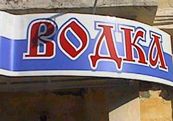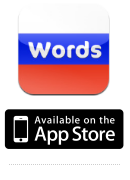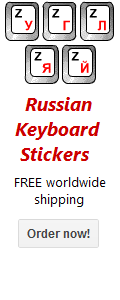 FR FR |
About us | Home | User agreement | Link to us |
Conjugation of Verbs
Changes, which Russian verbs undergo depending on person and number, are called conjugation.
There are two conjugations in Russian, called the 1st conjugation and the 2nd conjugation (or E-conjugation and И-conjugation, respectively).
The 1st conjugation verbs are those, which have the letter "е" in their endings, for example:
читать (to read)
| ты (you - singular) | читаешь |
| он (he) | читает |
| мы (we) | читаем |
| вы (you - plural) | читаете |
The 2nd conjugation verbs have the letter "и" in their endings.
верить (to believe)
| ты (you - singular) | веришь |
| он (he) | верит |
| мы (we) | верим |
| вы (you - plural) | верите |
You will need to determine the conjugation of the verb in order to write correct personal endings. Usually, there is no problem with this for verbs which have stressed endings. For such verbs the same letter is used in writing as in speaking. For example, in words спишь, гребёшь the same letter is written as is heard.
| Remember:
Conjugation is typical only for present and future tense verbs used in indicative mood. Past tense verbs change only by gender and number. |
However if the stress is on the base rather than ending, choosing correct ending will be a bit challenging. You will need to determine the conjugation of the verb by looking at its infinitive and applying the following rule.
The 2nd conjugation verbs (with unstressed ending) are:
1. those, which end in -ить, like заправить, клеить, беспокоить. Exceptions are: брить, стелить, побрить, постелить, выстелить, etc.
2. seven verbs ending in -еть: смотреть, видеть, ненавидеть, зависеть, терпеть, вертеть, обидеть + all verbs derived from them, like посмотреть, увидеть, вытерпеть, завертеть, перетерпеть, etc.
3. four verbs ending in -aть: гнать, дышать, держать, слышать + all verbs derived from them, like прогнать, задышать, удержать, расслышать, etc.
4. The remaining verbs (not mentioned in points 1. to 3.) are 1st conjugation verbs.
There are some verbs, which can have the endings of both the 1st conjugation and the 2nd conjugation. These are the verbs хотеть, бежать and those derived from them (захотеть, добежать, etc.).
хотеть (to want)
| Singular | Plural | |
| 1st person | хочу | хотим |
| 2nd person | хочешь | хотите |
| 3rd person | хочет | хотят |
бежать (to run)
| Singular | Plural | |
| 1st person | бегу | бежим |
| 2nd person | бежишь | бежите |
| 3rd person | бежит | бегут |
Test yourself:
a) Assuming that 1st conjugation verbs end in -у(-ю), -ешь, -ет, -ем, -ете, -ут(-ют), what is the conjugation of the following verbs?
1. Верт__шь головой
2. Бре__шься по утрам
3. Беж__шь быстро
4. Хоч__т конфет
A. 1st conjugation
B. 2nd conjugation
C. can be both A. and B.
b) The verbs of what tense conjugate, i.e. change in person and
number?
1. Present tense verbs
2. Past tense verbs
3. Future tense verbs
Answers:
a) 1B (вертишь головой), 2A (бреешься по утрам), 3C (бежишь быстро), 4C (хочет конфет); b) 1 and 3
Got questions?
Ask them in the Russian Questions and Answers — a place for students, teachers and native Russian speakers to discuss Russian grammar, vocabulary, pronunciation, and other aspects of the Russian language.
Copyright 2001-2026 MasterRussian.com | Privacy Policy | Contact Us
 Russian Lessons
Russian Lessons
- Russian alphabet
- Names of letters
- Russian Q&A new
- Pronunciation: Cons.
- Pronunciation: Vowels
- Noun Gender/Number
- Cases of Nouns
- Russian Greetings
- Personal Pronouns
- Learning Russian
- 1000 Common Words
- 500 Russian Verbs
- Top Russian Nouns
- » All lessons
- » Guest lessons
 Browse Topics
Browse Topics
- Start learning Russian
- Forum
- Bookstore
- Dictionaries
- Russian - basic
- Russian - adv
- Pronunciation
- Russian Blog new
- Reading
- Test & quizzes
- Translation
- Verbs
- Verb Conjugations
- Russian numbers
- Russian Tests new
- Vocabulary
- Writing
- Folk music
- Fun stuff
- Leo Tolstoy
- Learner's lore
- Literature
- Personal blogs
- Picture Dictionary new
- Proverbs
- Publications
- Radio & TV
- Russian culture
- Schools in Russia
- Russian Words
- Russian names
- Software
- Russian Words iPhone
Clicks the "Like" button below to get daily updates on Facebook!
Click "Add to circles" to learn Russian on Google+

Search MasterRussian

English » Russian dictionary

WORD OF THE DAY
![]() RSS
|
iGoogle
|
My Yahoo!
RSS
|
iGoogle
|
My Yahoo!
Meaning: road, route, way
Pronunciation: [dah-ROH-gah]
Learn Russian words! »
TODAY'S STREET SIGN

Russian: Водка
English: Vodka
FOLLOW US ON TWITTER

MasterRussian on Twitter


